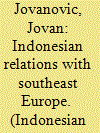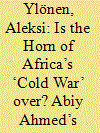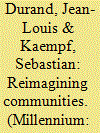| Srl | Item |
| 1 |
ID:
162099


|
|
|
|
|
| Summary/Abstract |
In the past few years, there has been a significant economic and political rapprochement between China and Russia, marked by the announcement of numerous trade agreements and investments in transport infrastructure and the exploitation of Russian natural resources. This cooperation seems to have intensified since the 2014 Ukrainian crisis. Some European and American media see it as a sign that China and Russia are developing a form of strategic alliance that could harm Western interests. This article analyses the different forms of Sino-Russian rapprochement whilst highlighting the economic and political limits of this cooperation.
|
|
|
|
|
|
|
|
|
|
|
|
|
|
|
|
| 2 |
ID:
167313


|
|
|
|
|
| Summary/Abstract |
Noticing the gap in the existing literature, this article attempts to argue that status-seeking motives do not necessarily result in zero-sum games and hence tries to summarise conditions for status-seekers to manage conflicts and realise cooperation with one another through creative use of social mobility and creativity strategies. As a case study, this article examines the evolving relations between India and China since 2013 and demonstrates how relations between these two status-seeking states can become confrontational with conflicting status-seeking incentives. For some time, the status competition seemingly dominated their interactions, when India was not willing to accept China’s power status second only to the USA, and China reluctant to recognise India as another rising power with nuclear capabilities. After the Donglang (Doklam) standoff, both governments are finding ways to manage an indirect path for cooperation through a newly discovered multilateral framework. The elements contributing to the stability of their relations lie in their choice of international identity and political calculations in which they can engage with the other based on their shared interests in fostering solidary among developing countries.
|
|
|
|
|
|
|
|
|
|
|
|
|
|
|
|
| 3 |
ID:
108898


|
|
|
| 4 |
ID:
103772


|
|
|
| 5 |
ID:
165764


|
|
|
|
|
| Summary/Abstract |
On 9 July 2018, Ethiopia and Eritrea signed a historical agreement pledging to end their mutual animosity and work for peace. The unprecedented rapprochement was facilitated by the new leadership in Ethiopia, merging interests between the two states and external mediation. This commentary looks into Ethiopian Prime Minister Abiy Ahmed Ali’s early reform initiatives and the dynamics of the rapprochement between Ethiopia and Eritrea.
|
|
|
|
|
|
|
|
|
|
|
|
|
|
|
|
| 6 |
ID:
092074


|
|
|
|
|
| Publication |
2009.
|
| Summary/Abstract |
United States rapprochement with China should be re-examined by taking into consideration the American negotiating approach towards Beijing regarding the role of Japan, the United States' major Asian ally and China's long-term rival in East Asia. Whilst announcing the Nixon Doctrine, which increased pressure on Japan to strengthen its defense and regional responsibilities, Nixon and Kissinger used the so-called "Japan Card," Japan's possible military resurgence and China's long-term fear of it, as a tacit negotiating tool to justify to Chinese leaders the continued United States military presence in East Asia. This article examines the impact of the United States rapprochement with China on the American negotiating process with Chinese leaders for the continuation of the United States-Japan Security Treaty and to what extent it changed China's policy toward American relations with Japan.
|
|
|
|
|
|
|
|
|
|
|
|
|
|
|
|
| 7 |
ID:
188391


|
|
|
|
|
| Summary/Abstract |
A popular view holds that foreign policy hawks have an advantage at bringing about rapprochement with international adversaries. This idea is rooted in domestic politics: voters respond more favorably to efforts at reconciliation when their own leader has a hawkish rather than a dovish reputation. Yet, domestic reactions are only part of the equation—to succeed, rapprochement must also evoke a favorable response by the adversary. In this research note, we argue that hawks who make conciliatory gestures may face international liabilities that could offset their domestic advantages. Foreign audiences should view doves who make overtures as more sincere and should therefore be more willing to support cooperation with foreign doves than with foreign hawks. We field a pair of survey experiments to examine whether Americans respond differently when foreign hawks versus foreign doves deliver the olive branch. We find that foreign doves fare better at eliciting cooperation because they are deemed more sincere, though the prospect of military vulnerability limits how willing Americans are to respond positively even to a dove who makes a gesture. Thus, while past research has shown that hawks are better positioned domestically to initiate rapprochement, our findings suggest that they have a harder time eliciting a favorable response from the adversary.
|
|
|
|
|
|
|
|
|
|
|
|
|
|
|
|
| 8 |
ID:
133549


|
|
|
|
|
| Publication |
2014.
|
| Summary/Abstract |
There comes a time when transmitting the history of a national past fails the context of the political present. France and Germany have shared tortuous historical experiences, yet the two are at the forefront of an unprecedented pedagogical development: for the first time ever, two nation-states have created a common history textbook that is used in their senior secondary schools. As such, each country, to borrow Ernst Gellner's formula, has abandoned - qua this textbook - its monopoly of legitimate education. Histoire/Geschichte detaches history from its exclusive national past and introduces the learners to a post-national present. It speaks in a tone that is demanded by a different time and by the new conditions of peoples who are living in a common political space. This article reflects on the meaning and reach of this precedent by first analysing the explicit political and pedagogical explanations inherent to the book. It then identifies and investigates some of the less evident effects of the textbook relating to rethinking war and history, rethinking the monopoly of education, rethinking national identity, and to offering another path to rapprochement.
|
|
|
|
|
|
|
|
|
|
|
|
|
|
|
|
| 9 |
ID:
099949


|
|
|
|
|
| Publication |
2010.
|
| Summary/Abstract |
This study analyzes the process of rapprochement in United States relations with Laos and Cambodia. It discusses the key domestic and international factors that influenced decision-making in Washington, Vientiane and Phnom Penh to initiate this process. US-Lao rapprochement has evolved gradually since the mid-1980s. Lao assistance in accounting for US servicemen missing-in-action during the Vietnam War was a key driver.
|
|
|
|
|
|
|
|
|
|
|
|
|
|
|
|